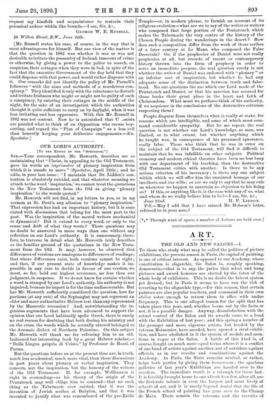OUR LORD'S AUTHORITY.
[TO THE EDITOR OF TEE " SPECTATOR."]
Sin,—Your correspondent, Mr. Howorth, describes me as maintaining that " Christ, in appealing to the Old Testament, gave its words an imprimatur of plenary inspiration from which it is unsafe to move " (Spectator, April 18th) ; and he adds, in your last issue : " I maintain that Dr. Liddon's con- tention is absolutely suicidal, and that whatever meaning we attach to the word inspiration,' we cannot treat the quotations in the New Testament from the Old as giving plenary inspiration' to the words quoted."
Mr. Howorth will not find, in my letters to you, or in my sermon at St. Paul's, any allusion to "plenary inspiration." That expression has had an important history, but it is asso- ciated with discussions that belong for the most part to the past. Was the inspiration of the sacred writers mechanical or dynamical ? Did it extend to every word, or only to the sense and drift of what they wrote P Thede questions may no doubt be answered in more ways than one without any reflection on our Lord's authority. It is unnecessary, there- fore, to traverse in detail what Mr. Howorth truly describes as the familiar ground of the quotations in the New Testa- ment from the Old. It may, however, be observed that 'differences of versions are analogous to differences of readings ; that where differences exist, both versions cannot be right ; and that, if our present state of knowledge makes it im- possible in any case to decide in favour of one version, we must, so far, hold our highest reverence, no less than our judgment, in suspense. If we do not know for certain whether a word is stamped by our Lord's authority, his authority is not impaired, because its import is for the time undiseoverable. But has Mr. Howorth sufficiently considered the question, how far portions (at any rate) of the Septuagint may not represent an older and more authoritative Hebrew text than any represented by the Masoretic recension P And, notwithstanding the in- genious arguments that have been advanced to support the opinion that our Lord habitually spoke Greek, there is surely no real reason for doubting that both during his ministry and on the cross, the words which he actually uttered belonged to the Aramaic dialect of Northern Palestine. On this subject Mr. Howorth will thank me for referring him to an old- fashioned but interesting book by a great Hebrew scholar,— " Della Lingua propria di Cristo," by Professor de Rossi, of Parma.
But the questions before us at the present time are, in truth, much less academical, much more vital, than those discussions in past years about plenary or verbal inspiration. They concern, not the inspiration, but the honesty of the writers of the Old Testament. If, for example, Wellhausen is right in contending—as his theory of the origin of the Pentateuch may well oblige him to contend—that no such thing as the Tabernacle ever existed, that it was the invention of Jewish scribes at Babylon, and that it was invented to justify what was remembered of the pre-Exilic
Temple—or, in modern phrase, to furnish an account of its religious evolution—what are we to say of the writer or writers who composed that large portion of the Pentateuch which makes the Tabernacle the very centre of the history of the Chosen People during the wanderings in the desert P How does such a composition differ from the work of those scribes of a later century at Le Mans, who composed the False Decretals P Or, if the prophecies of Daniel were not really. prophecies at all, but records of recent or contemporary history thrown into the form of prophecy in order to serve an immediate purpose, the real question surely is not whether the writer of Daniel was endowed with " plenary " or an inferior sort of inspiration, but whether he had any adequate sense of the distinction between truth and false- hood. No one questions the use which our Lord made of the Pentateuch and Daniel, or that his sanction has secured for those books their great place in the heart and faith of Christendom. What must we perforce think of his authority, if we acquiesce in the conclusions of the destructive criticism respecting them ?
People disguise from themselves what is really at stake, for reasons which are intelligible, and some of which must com- mand considerable sympathy. But let me repeat, the real question is not whether our Lord's knowledge, as man, was limited, or to what extent, but whether anything which he taught was, in consequence of his presumed ignorance, really false. Those who think that he was in error on the subject of the Old Testament, will find it difficult to maintain that he was infallible on other subjects. Political economy and modern ethical theories have been no less busy with one department of his teaching, than the destructive Old Testament critics with another. Is there to be any serious criterion of his inerrancy ; is there any one subject within which we will offer him the unstinted homage of our intellects and our wills ; or are we only to say that he may rule us whenever we happen to entertain no objection to his doing so ? If this, or anything like it, is the case with any of us, what and whom do we really believe him to be P—I am, Sir, &c.,
June 22nd. H. P. LIDDON. P.S.—May I add that I have missed Mr. Hobson's letter, referred to in your note ?


















































 Previous page
Previous page